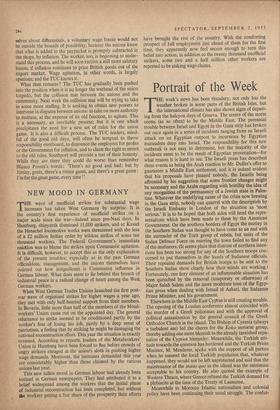NEW MOOD IN GERMANY
THE wave of unofficial strikes for substantial wage increases has taken West Germany by surprise. It is the country's first experience of unofficial strikes on a major scale since the war—indeed since pre-Nazi days. In Hamburg, shipyards dismissed 11,000 strikers, and at Kassel the Henschel locomotive works were threatened with the loss of a £2 million Indian order by wildcat strikes of some ten thousand workers. The Federal Government's immediate reaction was to blame the strikes upon Communist agitation. It is difficult, however, to accept this as the only explanation of the present troubles; especially as in the past German officialdom, management, and the unions themselves have ' pointed out how insignificant is Communist influence in German labour. What does seem to lie behind this breach of industrial peace is a radical change of heart among the West German workers.
When West German Trades Unions launched the first post- war wave of organised strikes for higher wages a year ago, they met with only half-hearted support from their members. In Bavaria. little more than half of the members of the Metal- workers' Union came out on the appointed day. The general reluctance to strike seemed to be conditioned partly by the worker's fear of losing his job, partly by a deep sense of patriotism, a feeling that by striking he might be damaging the national reconstruction effort. This year the situation is exactly reversed. According to reports, leaders of the Metalworkers' Union in Hamburg have been forced to flee before crowds of angry strikers enraged at the union's sloth in pushing higher wage demands. Moreover, the increases demanded this year are considerably higher than those claimed by the various unions last year.
This new sullen mood in German labour had already been noticed in German newspapers. They had attributed it to a belief widespread among the workers that the initial phase of industrial reconstruction has been completed, but without ilise workers getting a fair share of the prosperity their efforts have brought the rest of the country. With the comforting prospect of full employment just ahead of them for the first time, they apparently now feel secure enough to turn this belief into action; in addition to the twenty thousand unofficial strikers, some two and a half million other workers are reported to be staking wage claims.


































 Previous page
Previous page